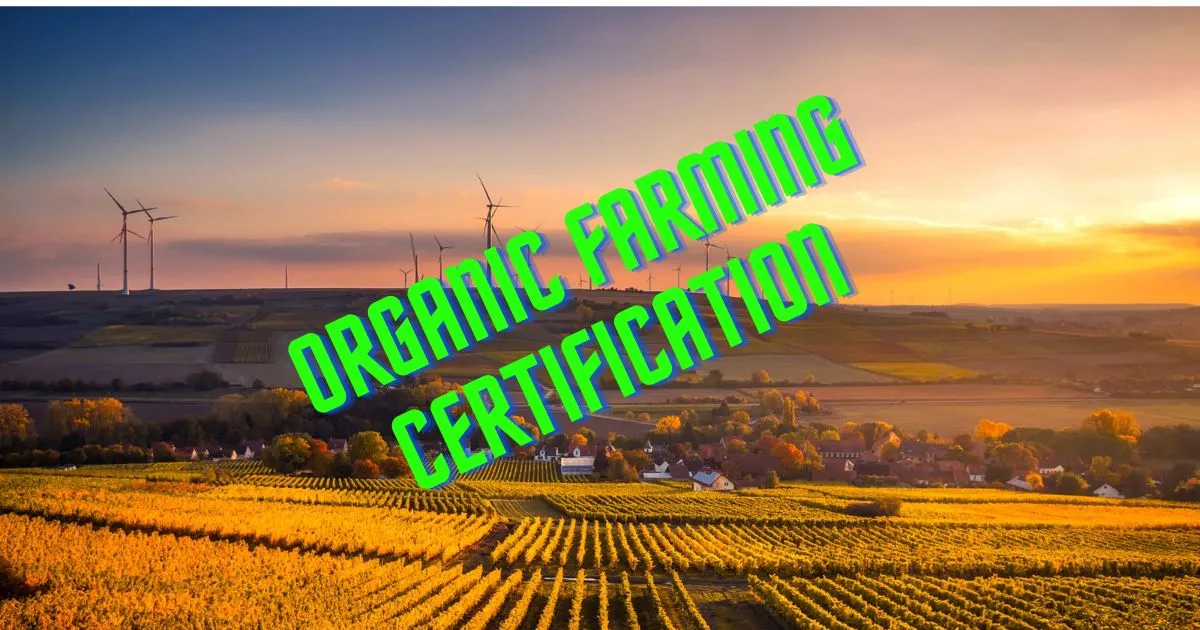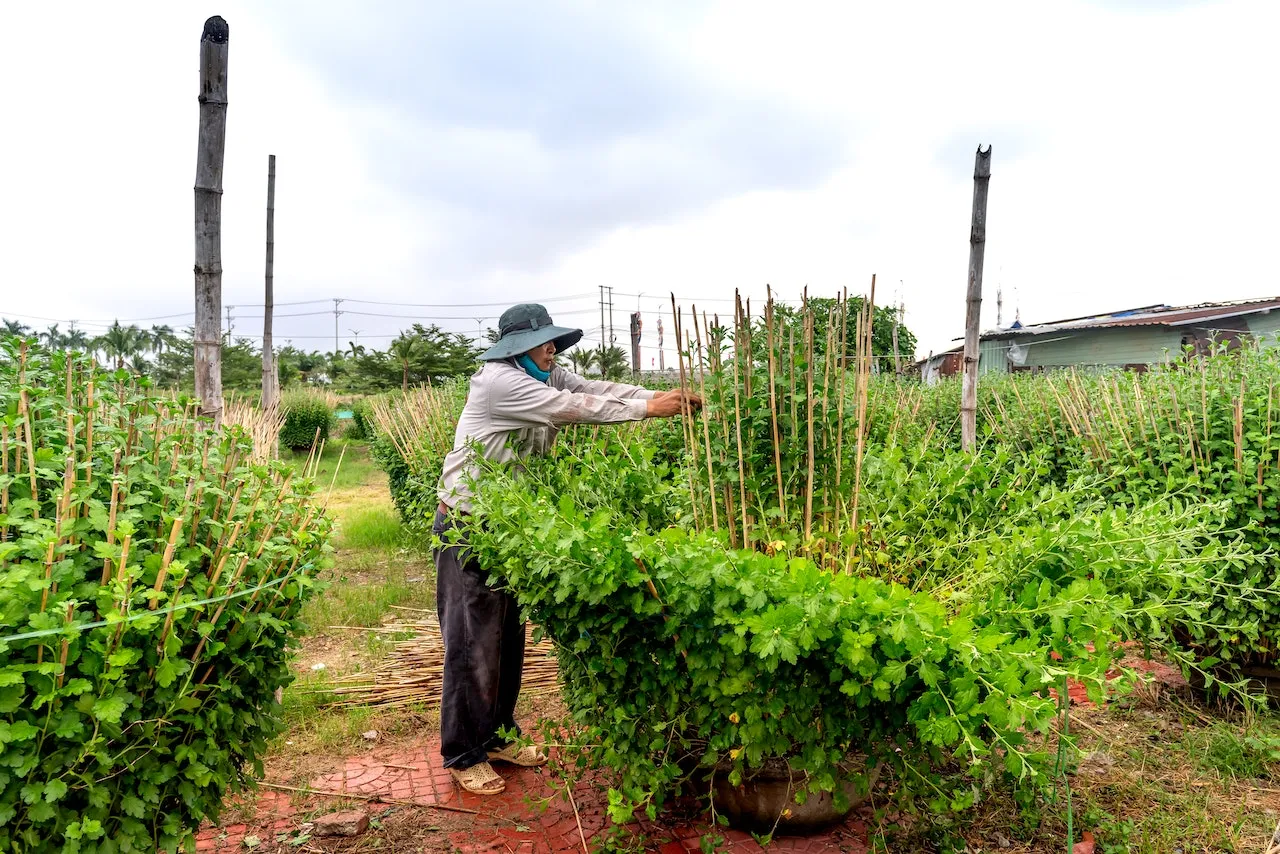Introduction
As more customers become aware of the significance of making healthy and sustainable food choices, the organic farming sector is expanding. Due to this rising demand, it is important to confirm that the goods bearing the label “organic” were actually cultivated and processed in accordance with the necessary requirements.
The process of organic certification aids in ensuring that these requirements are met, although there have been disagreements on which techniques should be permitted or not. The certification procedure for organic farming will be covered in this blog article, along with current debates on how to make the certification process rigorous and open.
The definition of organic farming
Organic farming prohibits the use of synthetic fertilizers, herbicides and genetically modified organisms. Instead, biological methods such as composting, crop rotation and biological pest control are used. The goal of organic farming is to produce food in a manner that is sustainable for the environment, ethical for society and profitable for farmers.
Why organic certification is important
The importance of organic certification lies in its ability to guarantee that the goods bearing the organic label adhere to the necessary criteria. This gives customers the assurance that the food they are purchasing has been produced in an affordable, socially responsible, and environmentally sustainable manner. Also, it aids farmers in getting a fair price for their goods and accessing the expanding market for organic goods.
The certification process for organic farming
The organic farming certification process is divided into different stages. Farmers should first contact the certification body. The certification body reviews the application and conducts inspections to ensure that the facility meets the required standards. Evaluation of soil, water supply, pest control strategies, application of fertilizers and other inputs will be part of the inspection. If the company meets the requirements, the certification body will issue an organic certificate.
The role of certification bodies Certification bodies play a crucial role in the organic certification process
Certification bodies are responsible for verifying that organic products meet certain standards layout by national or international governing bodies and play an important role in the organic certification process. These standards contain requirements on how products are manufactured, processed and packaged. Certification bodies must be accredited by relevant national or international bodies to ensure that they are qualified to carry out certification processes. This accreditation process includes demonstrating that the certification body has the necessary technical expertise, resources and processes to ensure that it can conduct fair and accurate certification assessments.
Certification bodies are mostly non-profit, impartial third-party entities. These entities might have their headquarters in the country where the items are manufactured or in the country where these are imported. At the outset of the certification procedure, the manufacturer or processor files an application to request certification on the organic items. The operation will next be evaluated by the certification entities to verify and validate if it meets organic guidelines. This examination will look at the operation’s production and processing operations, as well as its record-keeping and labelling systems.
The certifying organisation gives an organic certificate if a firm satisfies organic requirements. This certificate is a legal document that confirms the farm satisfies organic criteria and is permitted to identify its goods as organic. Furthermore, certifying authorities audit farms on a regular basis to verify they follow organic requirements. Depending on the certification body’s policies and the type of product being certified, these inspections may be performed annually or more regularly.
Organic standards are also enforced by certification agencies. If a farm is found to be in breach of organic requirements, the certifying body has the authority to withdraw the organic certification as well as conduct other enforcement steps. Fines, suspension of certification, or legal action may be imposed. Certification bodies may also report infractions to the importing country’s applicable regulatory authority or certification organisation.
In addition to verifying compliance with organic standards, certification bodies also provide information and support to producers and processors seeking certification. They may offer training programs, technical support and advice on best practices in organic production and processing. This support is especially valuable for small producers with limited resources and technical expertise.
Certification bodies are also crucial in safeguarding the integrity of the organic market. The demand for organic products has risen dramatically in recent years, and an increasing number of businesses are seeking organic certification. Unfortunately, this has led to examples of fraud and deception in which items are labelled as organic while not meeting organic requirements. Certification bodies aid in the prevention of fraud and mislabeling by ensuring that products fulfil organic criteria and enforcing noncompliance.
To nutshell, the certifying bodies are critical to the organic certification process. They are in charge of ensuring that organic goods satisfy particular criteria, enforcing those criteria, and giving information and assistance to growers and processors seeking certification. Certification bodies also serve to protect the organic market’s integrity by avoiding fraud and mislabeling. As the demand for organic products grows, certifying agencies will become more vital in preserving the confidence and legitimacy of the organic label.
The importance of transparency in the certification process
To guarantee that consumers trust the organic label, transparency in the certification process is crucial. The evaluation standards, inspection techniques, and decision-making processes of certification bodies must be open and transparent. Also, they must disclose details regarding the farms they have certified as well as any problems that have occurred throughout the certification procedure.
The debate on certain practices in organic farming
On the subject of whether specific methods should be permitted in organic farming, there have been discussions. Consider the controversy over the inclusion of hydroponic cultivation in organic certification. Instead of using dirt, hydroponic farming entails growing plants in nutrient-rich water. While some contend that hydroponic farming does not satisfy the soil-based requirements for organic farming, others contend that it is a viable and effective method for producing organic food.
The debate on synthetic inputs in organic farming
The use of artificial inputs in organic farming is also in contention. Some contend that certain synthetic inputs, including tetracycline and copper sulphate, should be permitted in organic farming in order to control pests and diseases. Others contend that using synthetic inputs runs counter to the tenets of organic farming and that alternative strategies, including biological pest control, ought to be employed in their place.
The importance of ongoing discussions in organic certification
Questions concerning how to balance social responsibility, economic viability, and environmental sustainability in organic farming have been raised in discussions about particular organic farming techniques and the use of synthetic inputs. The effectiveness of organic certification depends heavily on continuing talks to confirm and validate that the standards` criteria still hold true.
The importance of education and training for organic certification
Farmers seeking organic certification must complete the requisite education and training. Certification organisations provide training programmes to help farmers understand the requirements for becoming certified organic and adopting sustainable agricultural techniques. This education and training is critical to ensuring that farmers can meet and maintain the minimum standards throughout time.
The challenges facing organic certification
Organic certification raises two concerns: the expense and the time duration of the certification process. For small businesses, the cost of certification and the length of the procedure might be intimidating. Another problem is ensuring that the certification process is thorough and transparent. Some certifying bodies may not follow the standards or may be influenced by other interests.
What is the Certification Process for Organic Farming in USA, Europe and India?
USA:
Europe:
The European Union’s organic farming regulations, which establish criteria for organic production and labelling across the Union, oversee the certification process for farming in Europe (EU). Farmers must adhere to the EU’s organic farming criteria, submit to inspection by a certification agency that is authorised by the national government in their country, and keep thorough records of their agricultural methods in order to become certified organic in Europe.
In order to guarantee continued adherence to the organic requirements, the certification procedure in Europe entails an initial application, an on-site inspection, and an annual review. All organic products that are sold in the EU must be labelled with the EU organic mark and information about the certifying organisation that approved the item.
India:
The National Program on Organic Production (NPOP) and the Participatory Assurance Program of India regulate the certification procedure of organic agriculture in India (PGS-India). The Agricultural and Processed Food Export Development Authority must authorize organizations to certify under NPOP, a certification program that establishes the National Standard for Organic Production (APEDA).
Smallholder farmers of India can certify each other through PGS-India’s decentralized certification scheme, built on community participation and trust. Farmers must follow established guidelines for organic farming, undergo inspection by a certification body, and keep adequate records of their farming practices in order to obtain organic certification in the country. India.
Conclusion
An important step in ensuring that organic products meet the required standards is organic certification. The ongoing debate on specific organic farming practices highlights the need for an ongoing dialogue on how to strike a balance between social responsibility, economic viability and environmental sustainability. increase. The certification process is rigorous, and transparency, information and training are key to ensuring farmers meet the required standards. Despite the challenges, organic certification is an important step in ensuring customers have access to sustainable and healthy food options.

